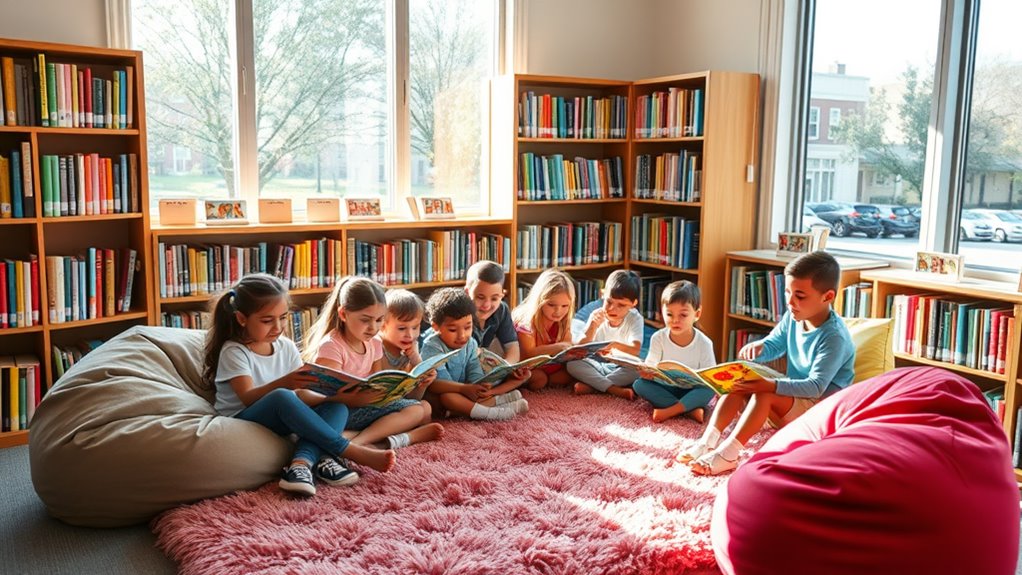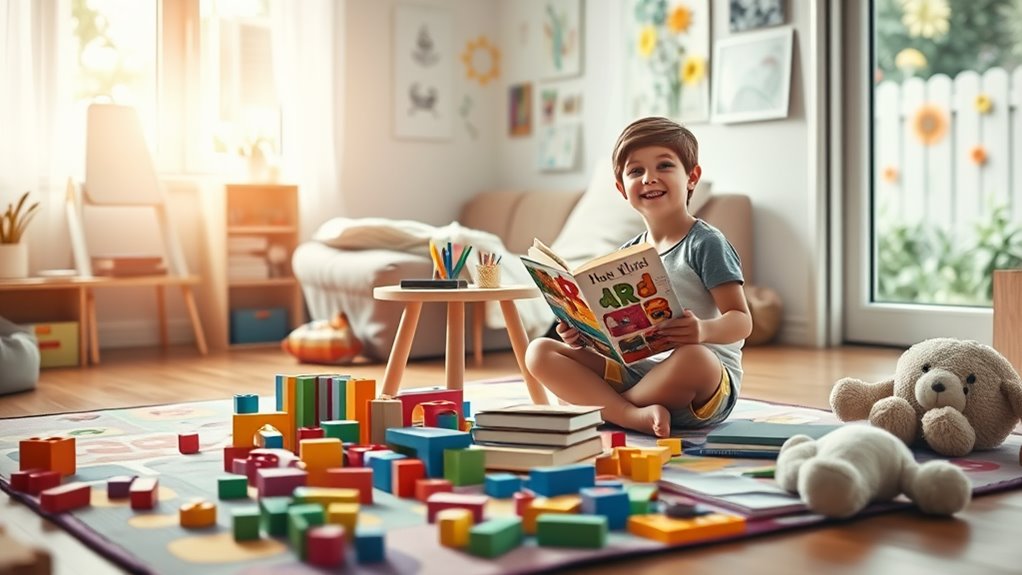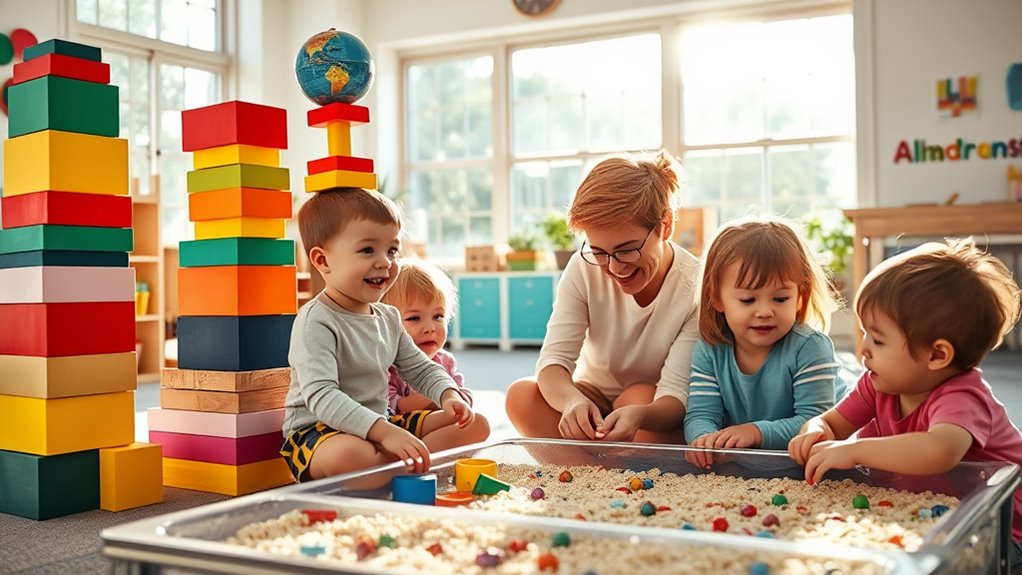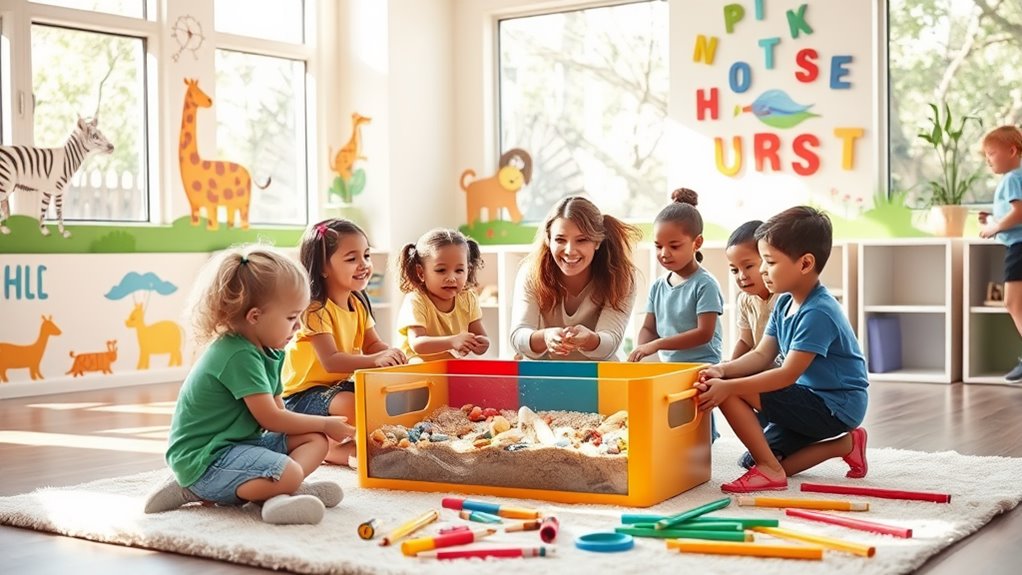How to Use Libraries as Educational Tools for Kids
When you think about educational tools for kids, libraries might not be the first thing that comes to mind, but they’re incredibly effective. They offer an array of resources that can ignite a child’s passion for learning and creativity. From interactive storytime sessions to themed events, libraries provide a dynamic environment for young learners to explore new ideas. You might wonder how to fully leverage these resources to enhance your child’s educational journey, especially in ways that go beyond the usual books. Let’s explore some practical strategies that can make a significant difference.
Importance of Libraries in Education
Libraries play an essential role in shaping educational experiences for kids. They’re not just a place to borrow books; they’re gateways to imagination and knowledge. When you walk into a library, you enter a world filled with stories waiting to be discovered. That’s pretty exciting, isn’t it?
You might find yourself diving into adventure tales, science topics, or even history mysteries. Libraries give you access to resources that can help you with school projects or spark your curiosity. Plus, they host fun events, like reading clubs and workshops, where you can meet other kids who love learning just as much as you do.
Think about it: when you explore a library, you’re not just reading; you’re expanding your horizons! You can ask librarians for help, and they’ll guide you like treasure hunters leading you to hidden gems.
And let’s not forget the cozy reading nooks, perfect for curling up with a good book.
Exploring Library Resources
When you step into a library, a treasure trove of resources awaits you, ready to ignite your curiosity and support your learning. You’ve got books, of course, but there’s so much more!
Have you checked out the magazines or newspapers? They’re packed with fun facts and stories that can spark your imagination.
Don’t forget about the computers! You can research any topic you want, from dinosaurs to outer space. Plus, many libraries offer cool programs where you can learn coding or graphic design. How awesome is that?
And let’s talk about the librarians. They’re like treasure hunters for information. If you’re not sure where to start, just ask them! They love helping kids find what they need, whether it’s a book report or a project about your favorite animal.
Finally, keep an eye out for special collections. Some libraries have local history sections or even art displays. Each visit can surprise you with something new!
Organizing Educational Activities
After you’ve explored the wealth of resources available, it’s time to put that knowledge into action by organizing educational activities. Think of activities that grab kids’ attention and make learning fun. You could host storytime sessions where kids immerse themselves in their favorite books. Invite them to share what they love about the stories, or even act them out!
Another idea is to set up a scavenger hunt in the library. Create clues that guide kids to different sections, encouraging them to discover new topics and genres. You might even throw in some trivia questions related to the books they find.
Don’t forget to involve parents, too! Organizing workshops or family nights can create a sense of community. You could invite local authors for readings or panel discussions, making it an unforgettable experience for everyone.
And hey, if you’d like to keep things light, consider a themed day like “Wacky Hat Day” where everyone wears their silliest hat while reading. This brings laughter and creativity into learning, making the library a lively learning hub.
Creating a Reading Challenge
A reading challenge can ignite kids’ enthusiasm for books and inspire them to explore new genres. You can kick off a fun reading challenge by setting a specific goal—like reading ten books in a month or diving into three different genres. This way, kids can discover mysteries, fantasy adventures, or even non-fiction that sparks their curiosity.
To make it exciting, consider adding fun themes each week, like “Wacky Wednesday” where they read a book with a silly title or “Mystery Monday” for thrilling whodunits. You can encourage them to keep track of their progress with a colorful chart or a digital app, turning it into a friendly competition. Who doesn’t love a little bit of rivalry, right?
Don’t forget to celebrate their achievements! Host an end-of-challenge party where everyone can share their favorite reads. You could even offer small prizes, like bookmarks or stickers, to keep that motivation rolling.
Utilizing Storytime Sessions
Storytime sessions can be a magical way to engage kids and foster a love for reading. When you take your child to the library for a storytime session, it’s not just about listening to stories; it’s an adventure waiting to happen!
Picture cozy corners filled with colorful pillows, kids gathered around, and a librarian bringing tales to life with animated voices.
Let your child experience the joy of discovering new characters and exciting plots. They’ll giggle at funny parts, gasp at surprises, and maybe even learn something new!
Plus, storytime helps develop listening skills and sparks their imagination. It’s like a mini-vacation for their minds!
Don’t forget to ask the librarian about the schedule. Many libraries offer themed storytimes, where kids can immerse themselves in fairy tales, science fiction, or even learn about different cultures.
You can also encourage your child to pick out books to take home afterward, enhancing their reading experience.
Engaging With Library Programs
Libraries offer a wealth of programs that can ignite your child’s curiosity and creativity. From summer reading challenges to craft workshops, there’s something for every little explorer.
These programs aren’t just fun; they’re designed to help kids learn in engaging ways. Your child can immerse themselves in science experiments, join book clubs, or even attend storytelling sessions that bring books to life.
Don’t forget about the special events! Many libraries host guest speakers, movie nights, and themed parties. These activities can spark your child’s imagination and introduce them to new interests.
Plus, it’s a fantastic way for them to meet other kids who share similar passions.
Make it a family outing! Attend programs together, and discuss what you learn afterward. This builds a bond between you and your child while supporting their educational journey.
Collaborating With Librarians
Building a strong relationship with librarians can enrich your child’s educational experience immensely. These amazing folks are more than just bookkeepers; they’re treasure hunters!
When you work together with librarians, you open up a world of resources and knowledge that can truly benefit your child.
Start by introducing your child to the librarian. Encourage them to ask questions about books, programs, or even fun facts. Librarians love sharing their knowledge, and they can help your child discover new interests and hobbies.
Plus, they often know about cool events happening at the library, like storytime or craft sessions.
You can also collaborate on reading lists. If your child is into dinosaurs or space, librarians can suggest books that’ll make their eyes light up.
And let’s be honest, who doesn’t want to read about a giant T-Rex?
Finally, don’t hesitate to seek advice on research projects. Librarians are experts at finding information, and they can teach your child how to navigate resources effectively.
Encouraging Research Skills
Helping your child develop research skills is a fantastic way to empower them academically. Libraries are treasure troves of information, and you can make exploring them a fun adventure!
Start by encouraging your child to pick a topic they’re curious about. Whether it’s dinosaurs, space, or even their favorite video game, let them explore.
Show them how to use the library catalog to find books, magazines, or even videos. It’s like being a detective, searching for clues!
Remind them that not all books are created equal—some might be outdated. Help them learn to spot credible sources, just like a superhero spots a villain in disguise.
When they find information, encourage them to take notes and ask questions. “Why is this important?” or “What else can I learn?” can spark deeper thinking.
And don’t forget to celebrate their discoveries! A little high-five can make them feel like a research champion.
Finally, remind them that research isn’t just about finding facts; it’s about discovering new ideas and perspectives. Who knows? They might just uncover something that changes how they see the world!
Building a Home Library
Creating a home library can spark a lifelong love for reading in your child. Imagine a cozy corner filled with colorful books, just waiting to be explored! Start by choosing a space in your home, like a bookshelf in the living room or a little nook in your child’s bedroom.
Next, think about the types of books your child enjoys. Do they love adventure, fantasy, or mysteries? Gather a mix of genres to keep things exciting. You can visit local libraries or thrift stores to find great deals on books. Don’t forget to include some classics—these can be timeless treasures!
Once you’ve got your collection, make the library inviting. Add comfy seating, some fun bookmarks, and maybe even a little reading light. Encourage your child to pick a book each week for family reading time. You can even create a fun “book club” where you discuss what you’ve read together.
Building a home library isn’t just about books; it’s about creating a space where imagination can soar. So, roll up your sleeves, gather those books, and watch your child’s love for stories blossom!
Happy reading!
Fostering a Love for Learning
Fostering a love for learning starts with igniting curiosity in your child. You can spark that interest by taking them to the library, where every shelf is filled with stories waiting to be discovered. Encourage them to explore different genres—adventure, mystery, or even nonfiction. You might be surprised at what catches their eye!
Another great way to nurture this love is by turning reading into a fun family activity. Set aside time each week for family reading nights. Grab some snacks, snuggle up, and immerse yourselves in a book together. Discuss your favorite parts and ask open-ended questions. You’ll be amazed at how much more excited they’ll become when they see that learning can be fun.
Also, don’t forget to celebrate their achievements, big or small! Whether they finished a challenging book or learned something new, praise their efforts. It’ll show them that learning is a journey worth taking.
Finally, let your child see you enjoying learning too. Share what you’re reading or ask them about their books. When they see your enthusiasm, they’ll want to join in on the fun.




